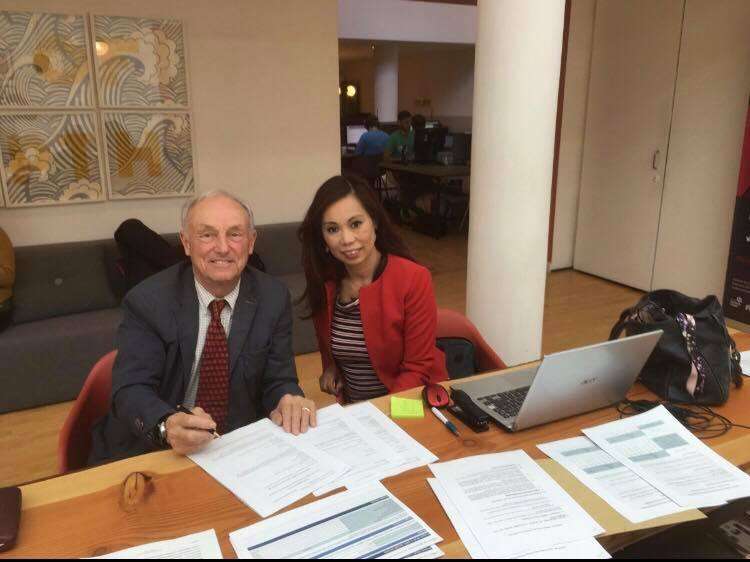The Polish Entrepreneurs In Ireland Series – Maciek Bator
An interview with CRAIC’s NI Programme Manager, Maciek Bator by the Irish Executives Network as part of the Polish Entrepreneurs In Ireland Series
Irish Executive Network: Who are you and where are you based?
Maciek Bator: I am a proud Polish living in Northern Ireland since 2004. Over ten years ago I decided to leave Poland for approximately 3 months… and I have been living abroad ever since. Northern Ireland has become my new home but every chance I get, I try to promote my hometown in Poland, Płock. If you are looking for a great destination for a city break that is full of history (former capital of Poland) and surrounded with beautiful nature, I highly recommend you to visit Płock. It was recently recognised as a Prime City Destination for Investment and Innovation by the Europe Business Assembly (EBA).
IEN: Why Northern Ireland? What do you like the most in Belfast?
MB: I ended up in Northern Ireland by coincidence. Shortly after Poland joined EU in 2004, I decided exercise one of the fundamental rights for EU citizens, the right to free movement. Thanks to an offer from an Ireland based recruitment agency, I was sent to Moira, a small town near to Belfast.
My perception of Northern Ireland was mainly based on images and information that I gathered from the media, relating to violence, terrorism and conflict. Now I know it was false. Northern Ireland still faces some repercussion from the Troubles but if you are looking for a place to invest, the time is right to take Northern Ireland under consideration. There are plenty of similarities between Poland in the early 90s and Northern Ireland today. The international competition is not quite here yet, but at the same time, the level of creativity and craving for success amongst young entrepreneurs is creating a very unique blend and vibe. Northern Ireland is on its way to become the future perfect getaway for the Irish and British markets. Belfast is well known for its explosive character and it seems that this time it might erupt as one of the most entrepreneurial places in the Isles.
IEN: You are very involved in the community life, tell us more about it?
MB: My involvement started in 2006 when I was responsible for establishing the first Polish community organisation and for the next six years that was my main focus. During that period, I was able to better understand Northern Ireland and the people living here.I have been involved in promoting Polish culture, addressing issues in relation to social welfare of the Polish diaspora, solving racial motivated incidents and cross-community mediations. What I do is not because I am forced to, I am involved because I enjoy it and it makes me feel accomplished.
At present I am working on a new social enterprise venture, a training and consulting company, CRAIC NI which stands for Cultivate Respect, Appreciate Inclusion in Communities, Northern Ireland. Our main goal is to educate members of the public about diversity and equality by inviting them to participate in workshops and cross-community programs. CRAIC NI is run by a group of people representing different ethnic minority groups including Polish, Chinese and Traveller, which gives us a unique and innovative approach. In CRAIC NI, we believe in a cohesive society. Diversity is #goodcraic. If you are looking to get more information about this venture, please follow us on Twitter @CRAICNI or visit www.craicni.com
IEN: What are your views on the concept of Polish diaspora?
MB: I am in favour of it. Half of my family current lives abroad. When I was six years old, I lived in the States for awhile, which had a massive impact on my ability to see things, it broadened my perspective and shaped my understanding that the world is bigger than our own neighborhood but small enough for us to travel and explore. Living abroad will always give you additional experiences and add extra value to your life. After 50 years of living under the communist regime in a single identity community, Polish people should learn from others, expand mental boundaries and exchange ideas. We simply have to become involved in creating a more vibrant European society.
It is motivating to see so many Polish people establishing themselves in Ireland, UK and other European countries and not only to work for a minimum wage but more often playing leading roles in international companies who are willing to preserve their links with Poland and promote Poland on the international market. That’s definitely #goodcraic.
IEN: Do you think it is easy to be a foreigner in Ireland?
MB: Migration as a process is not easy by principle. Very often, I compare a migrant to a primary school student. You basically have to start everything from the beginning, learning a new language, including slangs and accents, discovering and understanding a new culture and establishing a new network of friends and colleagues. Migration is not for everyone; some people are more open and better motivated than others and, like in school, can achieve more in a short period of time. Migration should be seen by people as an opportunity, if it is not working out for you, don’t be afraid to move back home. It is better to have a simple life with your family than to struggle far away from home.
I would like to take this opportunity to say thank you to the Island of Ireland for your hospitality and for welcoming me with open arms. The kindness and generosity of the host community has helped me to establish myself here and I can now say that Belfast is my home. If you approach people with respect and fairness, fairness and respect will always come back to you. This should be the main rule for anyone who plans a new journey.
Interview By Pascal Derrien
pascal@irishexecutives.com
Edited version available here: Irish Executives Network


